What the Most Caring People in the World Know
For The American Nurse Project, filmmaker Carolyn Jones set out to interview nurses around the country about their work, and ended up talking about life, death and things that matter to all of us.
By Corrie Pikul
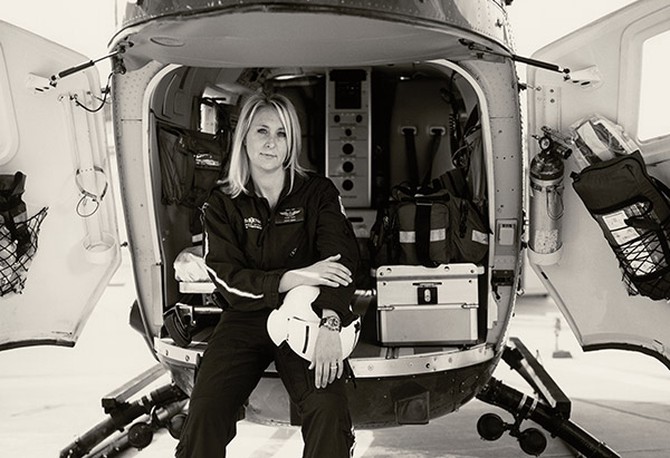
Photo: Carolyn Jones, courtesy of The American Nurse Project
They Understand How Hard It Is to Feel Helpless
Venus Anderson, BSN, CFRN
Nebraska Medical Center / Lifenet in the Heartland, Omaha, Nebraska
In addition to working in a pediatric ICU at Children's Hospital in Omaha, Venus Anderson is a member of a select group of about 5,000 flight nurses currently working in the U.S. She picks up patients who are critically ill or injured and transports them via helicopter to the nearest trauma center.
"My father was in a motorcycle accident four years ago. He lived in rural Iowa, and he was very badly injured. Another flight team went out to get him, but he didn't survive, and that shook my whole foundation. When I came back to work, everything seemed more personal to me. I used to not want to know the name of the patient or make it personal in any way when we picked someone up in the helicopter. I thought it made it easier to pick them up and then drop them off if I didn't make any emotional connection. But after my dad died, I started making it a point to talk to the families before we took off. I take two minutes to say, 'My name is Venus, and I'm going to be flying your loved one to Omaha. Can I get your phone number? When we get there, I'll call you and let you know how it went.' I make sure they come into the helicopter to give their loved one a kiss good-bye or say whatever they want to say to him or her. I realized that one thing that killed me was not knowing what was going on with my dad during the process. I don't think this gesture is a waste of time anymore."
Nebraska Medical Center / Lifenet in the Heartland, Omaha, Nebraska
In addition to working in a pediatric ICU at Children's Hospital in Omaha, Venus Anderson is a member of a select group of about 5,000 flight nurses currently working in the U.S. She picks up patients who are critically ill or injured and transports them via helicopter to the nearest trauma center.
"My father was in a motorcycle accident four years ago. He lived in rural Iowa, and he was very badly injured. Another flight team went out to get him, but he didn't survive, and that shook my whole foundation. When I came back to work, everything seemed more personal to me. I used to not want to know the name of the patient or make it personal in any way when we picked someone up in the helicopter. I thought it made it easier to pick them up and then drop them off if I didn't make any emotional connection. But after my dad died, I started making it a point to talk to the families before we took off. I take two minutes to say, 'My name is Venus, and I'm going to be flying your loved one to Omaha. Can I get your phone number? When we get there, I'll call you and let you know how it went.' I make sure they come into the helicopter to give their loved one a kiss good-bye or say whatever they want to say to him or her. I realized that one thing that killed me was not knowing what was going on with my dad during the process. I don't think this gesture is a waste of time anymore."
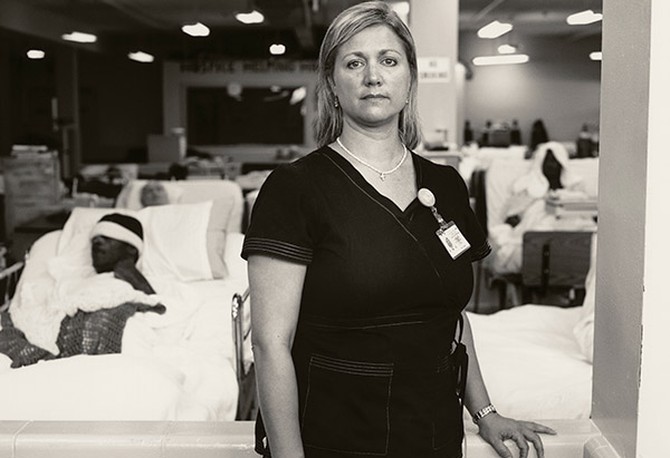
Photo: Carolyn Jones, courtesy of The American Nurse Project
They Can Find Grace in Unlikely Places
Tonia Faust, CCNM, RN
Louisiana State Penitentiary, Angola, Louisiana
Tonia Faust started working as a nurse in 1997 and now directs the hospice program at the Louisiana State Penitentiary.
"What makes this program unique is that we have 26 inmate volunteers in the program, who do this work for no compensation at all. They have their regular jobs, and then they come here during their recreational or downtime—either daily, every other day or, if it's a vigil, then 24/7. They go through a 40-hour educational program and then work under a mentor with one of our patients through death. For the most part, the dying inmates have someone with them all the time; no one dies alone. I mean, that is a luxury that most of us outside this prison won't have. It's truly exceptional to see these older, sometimes huge men sitting at the bedside of a dying inmate, reading or feeding them ice cream. The guys stay the entire time, and once the patient passes, they bathe and dress them for the morgue. Sometimes we even cry together. Then, when the body is gone, the volunteer will ask if he can go sit with someone else."
Louisiana State Penitentiary, Angola, Louisiana
Tonia Faust started working as a nurse in 1997 and now directs the hospice program at the Louisiana State Penitentiary.
"What makes this program unique is that we have 26 inmate volunteers in the program, who do this work for no compensation at all. They have their regular jobs, and then they come here during their recreational or downtime—either daily, every other day or, if it's a vigil, then 24/7. They go through a 40-hour educational program and then work under a mentor with one of our patients through death. For the most part, the dying inmates have someone with them all the time; no one dies alone. I mean, that is a luxury that most of us outside this prison won't have. It's truly exceptional to see these older, sometimes huge men sitting at the bedside of a dying inmate, reading or feeding them ice cream. The guys stay the entire time, and once the patient passes, they bathe and dress them for the morgue. Sometimes we even cry together. Then, when the body is gone, the volunteer will ask if he can go sit with someone else."
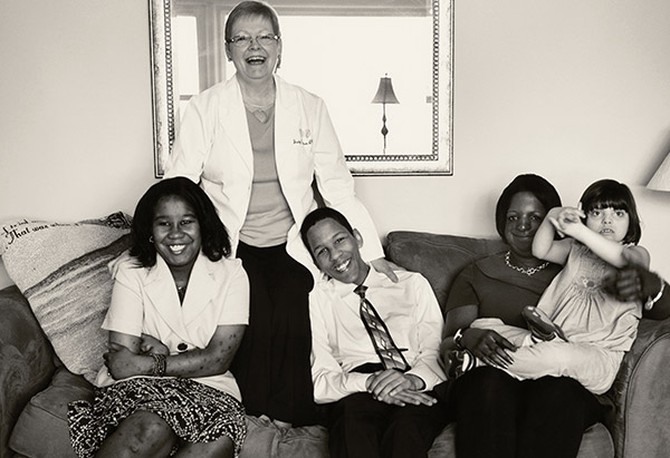
Photo: Carolyn Jones, courtesy of The American Nurse Project
They've Figured Out How to Prioritize
Judy Harrison, RN, MSN, CPNP, APRN
Hometown Pediatrics, Lexington, Kentucky
In addition to working as a pediatric nurse practitioner (and raising two biological children), Judy Harrison provided home foster care for more than 100 children, many of them with serious medical conditions. She also developed a regional training program for foster parents of medically fragile children.
"We don't do medical first; we do life first. That might mean doing dialysis in Hilton Head at six o'clock in the morning, so that we can all go to the beach. So be it. Living comes before medical... I understand that you need to love people with an open hand. People are not ours to hold on to; that's not the way that works, especially with children... Justin [who died at sixteen], like my other children, planned his own funeral. He invited every female in his high school to come, and they did; there were probably two hundred girls at the funeral. I had asked him how he invited them, and he told me, 'Well, Mom, you just walk up to them and say, "Hey, you wanna come to my funeral?"'...I don’t think we've ever had a sad funeral for any of my children. We know we did everything humanly possible to make their life wonderful."
Hometown Pediatrics, Lexington, Kentucky
In addition to working as a pediatric nurse practitioner (and raising two biological children), Judy Harrison provided home foster care for more than 100 children, many of them with serious medical conditions. She also developed a regional training program for foster parents of medically fragile children.
"We don't do medical first; we do life first. That might mean doing dialysis in Hilton Head at six o'clock in the morning, so that we can all go to the beach. So be it. Living comes before medical... I understand that you need to love people with an open hand. People are not ours to hold on to; that's not the way that works, especially with children... Justin [who died at sixteen], like my other children, planned his own funeral. He invited every female in his high school to come, and they did; there were probably two hundred girls at the funeral. I had asked him how he invited them, and he told me, 'Well, Mom, you just walk up to them and say, "Hey, you wanna come to my funeral?"'...I don’t think we've ever had a sad funeral for any of my children. We know we did everything humanly possible to make their life wonderful."
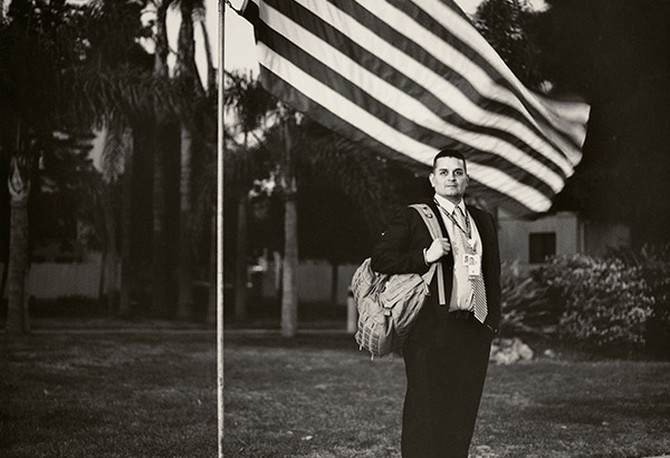
Photo: Carolyn Jones, courtesy of The American Nurse Project
They've Seen That the Spirit Often Refuses to Take a Break, Even When the Body Demands It
Brian McMillion, RN, MSN, MBA-HCM
VA San Diego Healthcare System, San Diego, California
After joining the Army at 18, Brian McMillion served active duty in the first Gulf War and spent years working as a military medic. With a master's degree in nursing, he is currently taking care of injured soldiers at the Joint Base Lewis-McChord Medical Command.
"In 2003, I was called away as a mobilized reservist to Landstuhl, a regional medical center in Germany that was a landing point for all of the medical evacuations coming out of Iraq and Afghanistan. You would go into the ICU and check to see if someone would be ready to go, and they had just woken up from being in a coma, or woken up from sedation that was needed because they were intubated, and you'd pull a tube out of their throat, and one of the first things they would say to you—laying there missing limbs—is, 'When can I go back?' Something happens to you inside when you hear that. You love them tremendously at that moment, but you also want to smack them and say, 'No! You ain't going anywhere. You've already given enough, brother.'"
VA San Diego Healthcare System, San Diego, California
After joining the Army at 18, Brian McMillion served active duty in the first Gulf War and spent years working as a military medic. With a master's degree in nursing, he is currently taking care of injured soldiers at the Joint Base Lewis-McChord Medical Command.
"In 2003, I was called away as a mobilized reservist to Landstuhl, a regional medical center in Germany that was a landing point for all of the medical evacuations coming out of Iraq and Afghanistan. You would go into the ICU and check to see if someone would be ready to go, and they had just woken up from being in a coma, or woken up from sedation that was needed because they were intubated, and you'd pull a tube out of their throat, and one of the first things they would say to you—laying there missing limbs—is, 'When can I go back?' Something happens to you inside when you hear that. You love them tremendously at that moment, but you also want to smack them and say, 'No! You ain't going anywhere. You've already given enough, brother.'"
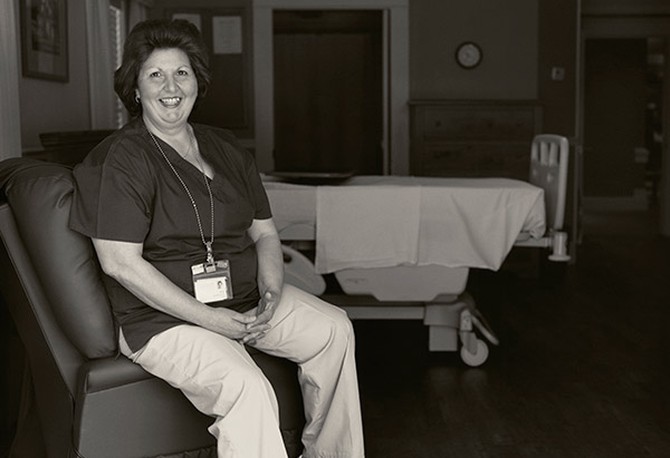
Photo: Carolyn Jones, courtesy of The American Nurse Project
They've Learned to Always Keep Miracles Up Their Sleeves
Elisa Frazer, RN
Tidewell Hospice, Port Charlotte, Florida
Elisa Frazer has worked in health-care administration for more than 30 years and is now a nurse case manager at an inpatient hospice house, where she cares for the dying and their families.
"As a nurse, I always fixed things; now I had to learn to fix things in a different way. I can't make my [hospice] patients better, but I can improve their situation. I can make sure we get financial aid for a funeral if the family can't afford it. I can arrange a wedding, which I've done several times. Once we had sixty people here for a catered affair, and it was actually beautiful. The bride wore her wedding gown to sleep that night. In another wedding, the groom was only in his twenties, but he had a brain tumor. His girlfriend had just given birth, and we had their wedding in the gazebo, with the six-month-old in her arms. It was so touching because the groom was able to stand up for the entire ceremony. These are like little miracles we can make happen."
Tidewell Hospice, Port Charlotte, Florida
Elisa Frazer has worked in health-care administration for more than 30 years and is now a nurse case manager at an inpatient hospice house, where she cares for the dying and their families.
"As a nurse, I always fixed things; now I had to learn to fix things in a different way. I can't make my [hospice] patients better, but I can improve their situation. I can make sure we get financial aid for a funeral if the family can't afford it. I can arrange a wedding, which I've done several times. Once we had sixty people here for a catered affair, and it was actually beautiful. The bride wore her wedding gown to sleep that night. In another wedding, the groom was only in his twenties, but he had a brain tumor. His girlfriend had just given birth, and we had their wedding in the gazebo, with the six-month-old in her arms. It was so touching because the groom was able to stand up for the entire ceremony. These are like little miracles we can make happen."
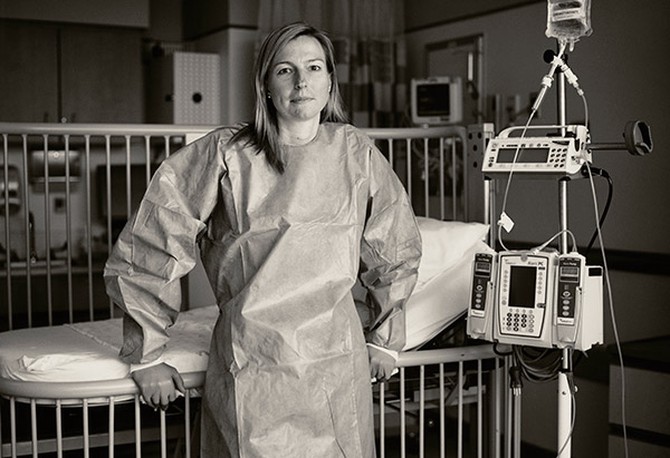
Photo: Carolyn Jones, courtesy of The American Nurse Project
They Know What to Hang On To, Even in the Most Horrible Situations
Jessica Graef, BA, MA, MSN, RN, CNL
Children's National Medical Center, Washington, DC
Jessica Graef is a staff nurse on the hematology/oncology unit, which provides treatment for children with cancer and blood disorders.
"What I've learned ... through this job is the strength of families. I thought I'd see people just losing it, but these families are tremendously strong...They are there for their children, and pull from their inner strength to cope and to help their children. I've learned so much about myself from seeing how other people interact, how they deal with things like this, and how they are able to come up with compassion in the most horrendous situations. I always try and have a sense of hope, because without that, what do you have? Some people think that pediatric oncology nurses are angels or saints, but I have to say that I have learned and gained from my patients and their families just as much as I have given to them."
The American Nurse Project, which includes a large-format book as well as a documentary forthcoming in 2014, was made possible with the support of Fresenius Kabi USA. Life-affirming stories like these are being continuously added to the project's web site, americannurseproject.com.
Next: 9 strangers who can change your life
Children's National Medical Center, Washington, DC
Jessica Graef is a staff nurse on the hematology/oncology unit, which provides treatment for children with cancer and blood disorders.
"What I've learned ... through this job is the strength of families. I thought I'd see people just losing it, but these families are tremendously strong...They are there for their children, and pull from their inner strength to cope and to help their children. I've learned so much about myself from seeing how other people interact, how they deal with things like this, and how they are able to come up with compassion in the most horrendous situations. I always try and have a sense of hope, because without that, what do you have? Some people think that pediatric oncology nurses are angels or saints, but I have to say that I have learned and gained from my patients and their families just as much as I have given to them."
The American Nurse Project, which includes a large-format book as well as a documentary forthcoming in 2014, was made possible with the support of Fresenius Kabi USA. Life-affirming stories like these are being continuously added to the project's web site, americannurseproject.com.
Next: 9 strangers who can change your life
Published 08/08/2013

